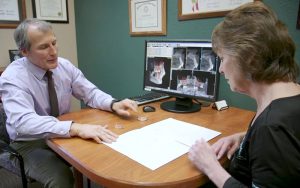The Denture Process in Loveland, CO
Receiving Your Custom Dentures
Losing teeth can significantly impact your life, not just due to the discomfort and pain but also because it can affect your self-esteem and your ability to eat and speak with ease. Fortunately, our Loveland, CO dentist, Dr. Howard, provides a solution through dentures.
Understand how the denture process works before making your choice. To book an appointment with our dentist in Loveland, CO, contact our office today by calling (970) 669-3918.
The Procedure for Dentures
The denture procedure generally involves several steps. It’s important to note that the process may vary depending on the type of denture, such as immediate dentures, you choose, compared to the traditional denture process described here.
Initial Consultation
The first step in determining if complete dentures are suitable for replacing missing teeth is to schedule a consultation at our Loveland, CO dental office with Dr. Howard. They will assess your oral health and discuss your requirements and expectations.
Based on this evaluation, our dentist will develop a treatment plan customized to your specific situation. Considerations include:
- Number of missing teeth
- Condition of your oral health
- Jawbone condition
- Any potential complications
Preliminary Impressions
Once the decision to proceed with dentures is made, our dentist will take impressions of your gums, teeth, and surrounding tissues to create a mold of your mouth. This mold is used to craft a customized denture that fits securely and comfortably.
Using these impressions and measurements, a dental laboratory constructs a detailed model of your mouth. This model assists in crafting dentures that fit the unique shape of your mouth accurately.
Wax Models
A wax model of the dentures is created to allow you to see how they will look and fit in your mouth. Any necessary adjustments can be made at this stage to ensure the final product meets your aesthetic and functional needs.
Final Denture Fitting
Once the wax model is approved, the final denture is created. These finished dentures are then fitted in your mouth, and any adjustments needed to ensure a comfortable and secure fit are made.
 Follow-up Appointments
Follow-up Appointments
After receiving your new dentures, you’ll likely have a follow-up appointment with our dentist to ensure they fit properly and that you’re comfortable with them. Dr. Howard may also provide guidance on how to care for and maintain your dentures to ensure their longevity. Regular dental visits are essential to keep both your new dentures and oral health in great condition.
Do You Need Tooth Extraction Before Getting Dentures?
Having teeth extracted before getting dentures is common for many who require complete or partial dentures. Extracting teeth beforehand is crucial for ensuring the proper fit and comfort of the dentures.
If a tooth extraction is necessary before getting dentures, your dentist will numb the area with a local anesthetic and proceed to remove the required teeth. In some instances, incisions in the gum tissue may be necessary to access the teeth.
After extraction, sutures may be placed in the gum tissue to aid healing. Patients are often advised to eat soft foods and avoid smoking and drinking alcohol for some time post-extraction to promote healing.
Once the gums have healed, our dentist will commence the process of creating your dentures.
The Lifespan of Your Dentures
 After completing the denture process, you’ll want to ensure they last as long as possible. On average, traditional dentures last between 5 and 10 years.
After completing the denture process, you’ll want to ensure they last as long as possible. On average, traditional dentures last between 5 and 10 years.
To extend the life of your new dentures, consider the following:
- Material Quality: The materials used to create a new denture set significantly affect their durability. High-quality materials tend to last longer.
- Proper Care: Proper maintenance and cleaning of dentures are essential. Neglecting oral hygiene can lead to quicker deterioration. A healthy mouth contributes to the longevity of your dentures.
- Dental Health: Over time, changes in your mouth’s shape and structure may affect the fit of your dentures. Regular dental visits can help manage this issue.
- Denture Type: The type of dentures you have (full dentures, partial dentures, implant-supported dentures) can impact their lifespan. For instance, implant-supported dentures tend to be more stable and durable.
Frequently Asked Questions
Generally, the process can take a few weeks to a few months. The timeline for receiving dentures varies based on several factors, including the type of dentures being made and any necessary adjustments. It involves multiple steps, such as creating a preliminary model, fabricating the final dentures, and ensuring they fit correctly and comfortably.
Yes, there are various types of dentures to choose from based on your specific needs. Full dentures replace all teeth in the upper and lower jaws, while partial dentures replace only a few missing teeth and are secured by clasps attached to neighboring teeth. Additionally, implant-supported dentures use dental implants for enhanced stability and comfort.
Achieve a Complete, Healthy Smile With Dentures
The process of getting dentures can be life-changing for individuals who have lost their teeth. While it may take time to adjust to wearing and caring for your new dentures, the benefits of being able to eat, speak, and smile just like with natural teeth are well worth it. With Dr. Howard’s help, you can enjoy a comfortable and personalized denture fitting process, along with ongoing support and care to ensure the longevity and effectiveness of your dentures.
Start your journey to a complete and healthy smile today by calling our Loveland, CO, office at (970) 669-3918 to schedule an appointment. We also welcome patients from Greeley, Evans, and Garden City.
